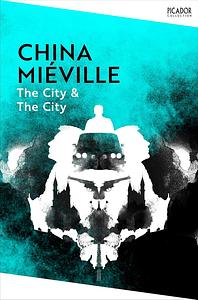Take a photo of a barcode or cover
adventurous
dark
mysterious
reflective
tense
medium-paced
Plot or Character Driven:
Plot
Strong character development:
No
Loveable characters:
Yes
Diverse cast of characters:
Yes
Flaws of characters a main focus:
No
adventurous
mysterious
I really liked the setting (two cities that exist in the same space, but which need to be perceived as two separate entities with an impermeable border). I enjoyed most of the plot (a murder mystery that is of course about the artificiality of the division of the two cities), but unfortunately didn't like the ending (which was very much about the murder mystery when I wanted it to be about the cities). Still a recommendation.
adventurous
dark
mysterious
tense
medium-paced
Plot or Character Driven:
Plot
Strong character development:
No
Loveable characters:
Complicated
Diverse cast of characters:
Yes
Flaws of characters a main focus:
No
adventurous
dark
mysterious
tense
medium-paced
Plot or Character Driven:
A mix
Strong character development:
No
Loveable characters:
Yes
Diverse cast of characters:
Yes
Flaws of characters a main focus:
No
dark
mysterious
tense
medium-paced
Plot or Character Driven:
Plot
Strong character development:
No
Loveable characters:
No
Diverse cast of characters:
No
Flaws of characters a main focus:
No
mysterious
medium-paced
Plot or Character Driven:
A mix
Strong character development:
No
Loveable characters:
Complicated
Diverse cast of characters:
Yes
Flaws of characters a main focus:
No
dark
mysterious
reflective
medium-paced
Plot or Character Driven:
Plot
Strong character development:
Yes
Loveable characters:
Yes
Diverse cast of characters:
No
Flaws of characters a main focus:
No
This was one of the weirdest reading experiences of late. Of course I knew Mieville could be weird, in fact he's counted as part of the New Weird with Jeff Vandermeer and others, and I'd read his story collection Three Moments of an Explosion which I found really hard and inaccessible compared to my favorite book of his called Embassytown.
It's set within a police novel framework, but that's about it as to recognizability. The setting is a nonexistent eastern Europe, and there's a sense that what it's talking about perhaps is related to the strained relationships between Muslim and Christian populations in that region. But there's no clear overlay that allow you to identify what is the novel is a metaphor for. Perhaps that's exactly why it's so fascinating. You're trying to crack this puzzle, but there's just no correspondence. It's an endless maze of seeing and unseeing.
It's set within a police novel framework, but that's about it as to recognizability. The setting is a nonexistent eastern Europe, and there's a sense that what it's talking about perhaps is related to the strained relationships between Muslim and Christian populations in that region. But there's no clear overlay that allow you to identify what is the novel is a metaphor for. Perhaps that's exactly why it's so fascinating. You're trying to crack this puzzle, but there's just no correspondence. It's an endless maze of seeing and unseeing.
In The City and The City, China Miéville, branches out into a new form of genre fiction: the mystery. While past novels, like Perdido Street Station and the Scar, have firmly established Miéville as a scifi/fantasy superstar they have not been proving grounds for writing a good mystery. Miéville works in some of his scifi and fantasy tendencies by creating this city in a version of our own world and having it split. Citizens of each city are supposed to unsee each other. Effectively, they act as though they have blinders on and the other city is non-existent. If they do notice it or cross over, this is seen as breach, and a mysterious police force intervenes. The idea is a little compelling, but not compelling enough for three hundred pages. The city is what Miéville is most interested in, and the overall murder mystery becomes quite secondary.
Most of the dialogue in the book is poorly constructed. Characters speak to give the reader information. It's a poor attempt to move the story forward that hurts the novel in another way. Character development is as non-existent as the boundary between the cities. The narrator is not intriguing or endearing. We never really see his motivations beyond it being his job. Yet, he is working outside the system. He must have motivations. Often times the characters seem as though they've been created by someone who has watched a lot of police dramas. The other awkward area in this novel is the attempt to ground it in our present world. There is an internet, email, and all the big corporations that litter expressways with billboards. To what effect? The pop culture corporate name dropping doesn't add anything. It doesn't make the Cities any more strange by seeing them next to our world.
Miéville is an exciting writer who will most likely write more books. For the time being though, this is one to miss.
Most of the dialogue in the book is poorly constructed. Characters speak to give the reader information. It's a poor attempt to move the story forward that hurts the novel in another way. Character development is as non-existent as the boundary between the cities. The narrator is not intriguing or endearing. We never really see his motivations beyond it being his job. Yet, he is working outside the system. He must have motivations. Often times the characters seem as though they've been created by someone who has watched a lot of police dramas. The other awkward area in this novel is the attempt to ground it in our present world. There is an internet, email, and all the big corporations that litter expressways with billboards. To what effect? The pop culture corporate name dropping doesn't add anything. It doesn't make the Cities any more strange by seeing them next to our world.
Miéville is an exciting writer who will most likely write more books. For the time being though, this is one to miss.





